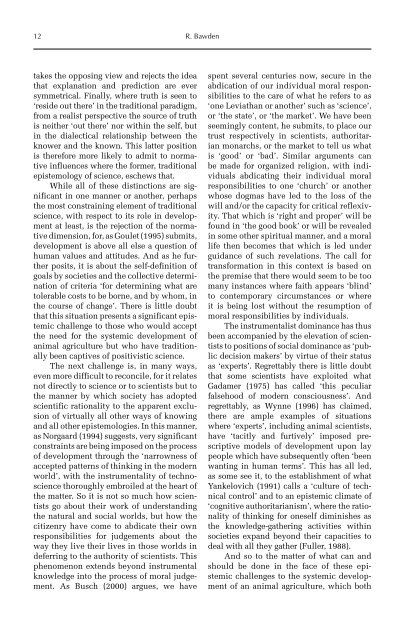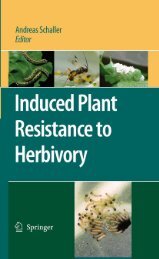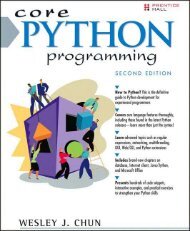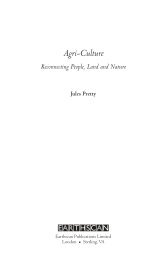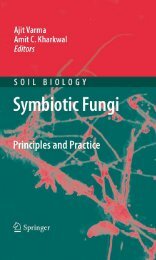Redesigning Animal Agriculture
Redesigning Animal Agriculture
Redesigning Animal Agriculture
Create successful ePaper yourself
Turn your PDF publications into a flip-book with our unique Google optimized e-Paper software.
12 R. Bawden<br />
takes the opposing view and rejects the idea<br />
that explanation and prediction are ever<br />
symmetrical. Finally, where truth is seen to<br />
‘reside out there’ in the traditional paradigm,<br />
from a realist perspective the source of truth<br />
is neither ‘out there’ nor within the self, but<br />
in the dialectical relationship between the<br />
knower and the known. This latter position<br />
is therefore more likely to admit to normative<br />
influences where the former, traditional<br />
epistemology of science, eschews that.<br />
While all of these distinctions are significant<br />
in one manner or another, perhaps<br />
the most constraining element of traditional<br />
science, with respect to its role in development<br />
at least, is the rejection of the normative<br />
dimension, for, as Goulet (1995) submits,<br />
development is above all else a question of<br />
human values and attitudes. And as he further<br />
posits, it is about the self-definition of<br />
goals by societies and the collective determination<br />
of criteria ‘for determining what are<br />
tolerable costs to be borne, and by whom, in<br />
the course of change’. There is little doubt<br />
that this situation presents a significant epistemic<br />
challenge to those who would accept<br />
the need for the systemic development of<br />
animal agriculture but who have traditionally<br />
been captives of positivistic science.<br />
The next challenge is, in many ways,<br />
even more difficult to reconcile, for it relates<br />
not directly to science or to scientists but to<br />
the manner by which society has adopted<br />
scientific rationality to the apparent exclusion<br />
of virtually all other ways of knowing<br />
and all other epistemologies. In this manner,<br />
as Norgaard (1994) suggests, very significant<br />
constraints are being imposed on the process<br />
of development through the ‘narrowness of<br />
accepted patterns of thinking in the modern<br />
world’, with the instrumentality of technoscience<br />
thoroughly embroiled at the heart of<br />
the matter. So it is not so much how scientists<br />
go about their work of understanding<br />
the natural and social worlds, but how the<br />
citizenry have come to abdicate their own<br />
responsibilities for judgements about the<br />
way they live their lives in those worlds in<br />
deferring to the authority of scientists. This<br />
phenomenon extends beyond instrumental<br />
knowledge into the process of moral judgement.<br />
As Busch (2000) argues, we have<br />
spent several centuries now, secure in the<br />
abdication of our individual moral responsibilities<br />
to the care of what he refers to as<br />
‘one Leviathan or another’ such as ‘science’,<br />
or ‘the state’, or ‘the market’. We have been<br />
seemingly content, he submits, to place our<br />
trust respectively in scientists, authoritarian<br />
monarchs, or the market to tell us what<br />
is ‘good’ or ‘bad’. Similar arguments can<br />
be made for organized religion, with individuals<br />
abdicating their individual moral<br />
responsibilities to one ‘church’ or another<br />
whose dogmas have led to the loss of the<br />
will and/or the capacity for critical reflexivity.<br />
That which is ‘right and proper’ will be<br />
found in ‘the good book’ or will be revealed<br />
in some other spiritual manner, and a moral<br />
life then becomes that which is led under<br />
guidance of such revelations. The call for<br />
transformation in this context is based on<br />
the premise that there would seem to be too<br />
many instances where faith appears ‘blind’<br />
to contemporary circumstances or where<br />
it is being lost without the resumption of<br />
moral responsibilities by individuals.<br />
The instrumentalist dominance has thus<br />
been accompanied by the elevation of scientists<br />
to positions of social dominance as ‘public<br />
decision makers’ by virtue of their status<br />
as ‘experts’. Regrettably there is little doubt<br />
that some scientists have exploited what<br />
Gadamer (1975) has called ‘this peculiar<br />
falsehood of modern consciousness’. And<br />
regrettably, as Wynne (1996) has claimed,<br />
there are ample examples of situations<br />
where ‘experts’, including animal scientists,<br />
have ‘tacitly and furtively’ imposed prescriptive<br />
models of development upon lay<br />
people which have subsequently often ‘been<br />
wanting in human terms’. This has all led,<br />
as some see it, to the establishment of what<br />
Yankelovich (1991) calls a ‘culture of technical<br />
control’ and to an epistemic climate of<br />
‘cognitive authoritarianism’, where the rationality<br />
of thinking for oneself diminishes as<br />
the knowledge-gathering activities within<br />
societies expand beyond their capacities to<br />
deal with all they gather (Fuller, 1988).<br />
And so to the matter of what can and<br />
should be done in the face of these epistemic<br />
challenges to the systemic development<br />
of an animal agriculture, which both


